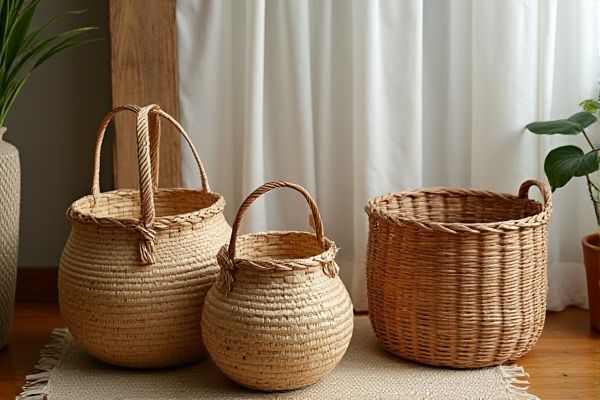
Handwoven baskets offer unique craftsmanship and durability born from traditional techniques, while machine-made baskets provide uniformity and faster production at a lower cost. Discover which type of basket best suits Your needs by exploring the detailed comparison in this article.
Table of Comparison
| Feature | Handwoven Basket | Machine-Made Basket |
|---|---|---|
| Craftsmanship | Skilled artisan weaving, unique patterns | Uniform patterns, repetitive designs |
| Material Quality | Natural fibers, eco-friendly | Mixed or synthetic materials |
| Durability | High durability with careful weaving | Consistent but often less sturdy |
| Appearance | Rustic, unique, natural aesthetic | Sleek, polished, consistent finish |
| Production Time | Longer, varies per design | Fast, mass production capable |
| Cost | Higher due to labor intensity | Lower, cost-effective for large quantities |
| Environmental Impact | Sustainable, biodegradable materials | Higher carbon footprint, synthetic waste |
| Customization | Highly customizable shapes and designs | Limited customization options |
Introduction to Handwoven and Machine-Made Baskets
Handwoven baskets are crafted by skilled artisans using natural fibers such as willow, rattan, or bamboo, resulting in unique, durable designs with intricate patterns. Machine-made baskets, typically produced in factories, use synthetic materials like plastic or metal, offering uniformity and mass production efficiency. The artisanal handwoven process emphasizes traditional techniques and eco-friendly materials, while machine-made baskets prioritize scalability and cost-effectiveness.
Historical Background of Basket Weaving
Handwoven baskets trace their origins back thousands of years, crafted by indigenous cultures worldwide using natural materials like reeds, grasses, and bamboo. Machine-made baskets emerged during the Industrial Revolution, utilizing synthetic fibers and mechanized processes for mass production. Your choice between handwoven and machine-made baskets reflects a connection to cultural heritage versus modern manufacturing efficiency.
Materials Used in Handwoven vs Machine-Made Baskets
Handwoven baskets primarily use natural materials such as rattan, bamboo, seagrass, and willow, which provide unique textures and eco-friendly qualities. Machine-made baskets often utilize synthetic fibers like plastic or resin, offering uniformity, durability, and resistance to moisture. The choice of materials significantly impacts the basket's aesthetic, environmental footprint, and functional lifespan.
Craftsmanship and Techniques Compared
Handwoven baskets showcase intricate craftsmanship, with artisans employing time-honored techniques such as coiling, twining, and plaiting to create unique, durable designs. Machine-made baskets rely on automated processes that prioritize uniformity and mass production, but often lack the individualized artistry and cultural significance embedded in handwoven creations. Your choice between the two reflects a preference for authentic craftsmanship versus cost-effective efficiency.
Aesthetic Differences and Design Variations
Handwoven baskets showcase unique, intricate patterns and natural textures that reflect the artisan's skill, creating each piece with subtle imperfections that enhance its charm. Machine-made baskets often feature uniform designs and consistent shapes, prioritizing mass production efficiency but lacking the personalized artistry of handwoven items. Your choice between the two depends on whether you value handcrafted authenticity and individuality or standardized precision and affordability.
Durability and Quality Analysis
Handwoven baskets typically exhibit superior durability due to the intricate craftsmanship that allows for flexible yet strong structures, using natural materials like rattan, willow, or seagrass. Machine-made baskets, often produced with synthetic fibers and uniform patterns, may lack the resilience and uniqueness of handwoven items, leading to potential wear and tear under heavy use. Choosing a handwoven basket ensures your purchase benefits from artisanal quality that can withstand daily handling better than mass-produced alternatives.
Environmental Impact and Sustainability
Handwoven baskets utilize natural fibers and traditional techniques, resulting in minimal carbon footprint and biodegradability, making them highly sustainable. Machine-made baskets often rely on synthetic materials and energy-intensive production processes, contributing to higher environmental pollution and waste. Choosing handwoven baskets supports eco-friendly practices by preserving artisanal craftsmanship and reducing plastic use in consumer products.
Cost Differences and Market Value
Handwoven baskets typically have higher market value due to the artisanal craftsmanship and time-intensive production process, which drives up their cost compared to machine-made baskets. Machine-made baskets benefit from mass production, resulting in lower retail prices but often reduced uniqueness and durability. Consumers often perceive handwoven baskets as premium products, justifying their higher price point in niche and luxury markets.
Cultural Significance and Artisanal Heritage
Handwoven baskets embody rich cultural significance, representing centuries-old artisanal heritage passed down through generations in indigenous and rural communities worldwide. Each handwoven basket reflects unique traditional techniques, patterns, and materials specific to its region, preserving local craftsmanship and storytelling. Machine-made baskets, while efficient and uniform, often lack the cultural depth and personalized artistry intrinsic to handwoven creations.
Choosing the Right Basket: Practical Considerations
Handwoven baskets offer unique craftsmanship, durability, and eco-friendliness, making them ideal for sustainable, artisanal preferences. Machine-made baskets provide uniformity, cost-effectiveness, and faster production, suitable for large-scale, budget-conscious needs. Consider purpose, aesthetic preference, durability, and environmental impact when choosing between handwoven and machine-made baskets.
 homyna.com
homyna.com